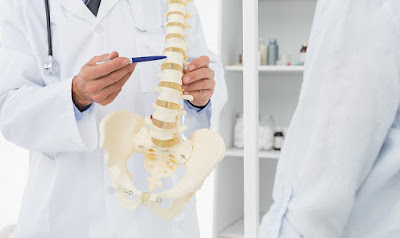How to Determine If
Spinal Cord Stimulation Will Help Your Back
Chronic spine pain
doesn't always respond well to traditional treatments involving medication and
various forms of physical therapy. It's situations like this when options such
as spinal cord stimulation (SCS) may be discussed. SCS is a type of therapy
involving surgical implantation of a small device that delivers mild electrical
pulses to the spinal cord, which blocks nerve signals sent to the brain that
would normally trigger sensations of pain. Keep reading to learn how to tell if
you might benefit from SCS.
A two-step screening process will determine if SCS is right for you. The first step involves a thorough exam and a review of your medical history. The second step is a trial use period done prior to permanent implantation. During this time, you'll use a version of the spinal cord stimulation system with wires that can be removed if SCS isn't successful.
Your Source of Spine-Related Pain
Another factor that will determine whether or not SCS is the best option for you is the source of your spine-related pain. One of the most common uses of SCS is on patients who've had back or neck surgery that hasn't sufficiently resolved pain or related symptoms, a situation referred to as failed back surgery syndrome. This form of electrical stimulation may also provide symptom relief for patients with:
• Arachnoiditis (scarring of protective layers of spinal nerves)
• Chronic back or neck pain
• Complex regional pain syndrome
• Peripheral neuropathy causing burning sensations in legs
• Refractory angina
• Chronic leg or arm pain
• Certain types of spinal cord injuries
Your Response to Conservative Treatments/Therapies
It's also possible for SCS to be recommended if conservative treatments aren't effective or if symptoms continue or get progressively worse. You'll generally be expected to give traditional treatment attempts, such as hot and cold therapy, therapeutic exercises, the use of pain and anti-inflammatory medications, and massage therapy, a try for 3-4 months or more to determine if you’re seeing meaningful improvements.
Conditions Not Likely to Respond Well to SCS
On the other hand, SCS may not be right for you if you have certain conditions not likely to be managed with electrical impulses delivered to nerves. For instance, patients with a demand-type cardiac pacemaker or bleeding disorders are typically not good candidates for spinal cord stimulation. You may also be advised to consider other treatment options if:
• A spinal infection is responsible for your symptoms
• Psychological issues such as depression or chronic anxiety are contributing to your pain
• You have untreated drug addiction
• You’re a recreational drug user or regular user of tobacco products*
* If you stop such activities or quit smoking, a Los Angeles spine surgeon may still consider you for SCS
Lastly, keep in mind spinal cord stimulation does not eliminate the source of symptoms or pain. What it does is alter the way the brain perceives pain, which means the amount of pain relief varies. The general goal with SCS is 50-70 percent pain reduction. Systems with a non-rechargeable battery will need to be replaced every 2-5 years. Stimulators with a rechargeable battery can last up to a decade, although they'll need to be charged daily. If you’re interested in spinal cord stimulation or another minimally-invasive procedure that can help you live a pain-free life, call The Spine Institute today at 310-828-7757.



Comments
Post a Comment